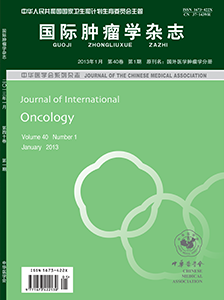Efficacy prediction and molecular mechanism of thyroid hormone levels and multi-target TKI therapy for renal cell carcinoma and hepatocellular carcinoma
引用次数: 0
Abstract
Hypothyroidism is a common adverse reaction in clinical multi-target tyrosine kinase inhibitor (TKI) and may be used as a predictor of efficacy of TKI drugs. Studies show that hypothyroidism is significantly associated with good prognosis in patients with renal cell carcinoma treated with multi-target TKI, which may be related to inhibition of vascular endothelial growth factor receptor pathway, potential off-target effects and inhibition of cell proliferation. Whereas in the patients with hepatocellular carcinoma who received multi-target TKI therapy, hypothyroidism is an indicator of poor prognosis, which is related to the T3/TR pathway regulating liver cancer growth and invasion. The predictive function and mechanism of thyroid hormone levels in different tumor patients receiving multi-target TKI drugs are different, and further research is still needed. Key words: Thyroid hormones; Neoplasms; Prognosis; Tyrosine kinase inhibitors甲状腺激素水平及多靶点TKI治疗肾细胞癌和肝细胞癌的疗效预测及分子机制
甲状腺功能减退是临床多靶点酪氨酸激酶抑制剂(TKI)常见的不良反应,可作为TKI药物疗效的预测指标。研究表明,多靶点TKI治疗肾癌患者甲状腺功能减退与预后良好显著相关,这可能与抑制血管内皮生长因子受体通路、潜在脱靶效应、抑制细胞增殖有关。而在接受多靶点TKI治疗的肝癌患者中,甲状腺功能减退是预后不良的一个指标,这与调节肝癌生长和侵袭的T3/TR通路有关。甲状腺激素水平对不同肿瘤患者接受多靶点TKI药物的预测功能及机制存在差异,有待进一步研究。关键词:甲状腺激素;肿瘤;预后;酪氨酸激酶抑制剂
本文章由计算机程序翻译,如有差异,请以英文原文为准。
求助全文
约1分钟内获得全文
求助全文

 求助内容:
求助内容: 应助结果提醒方式:
应助结果提醒方式:


